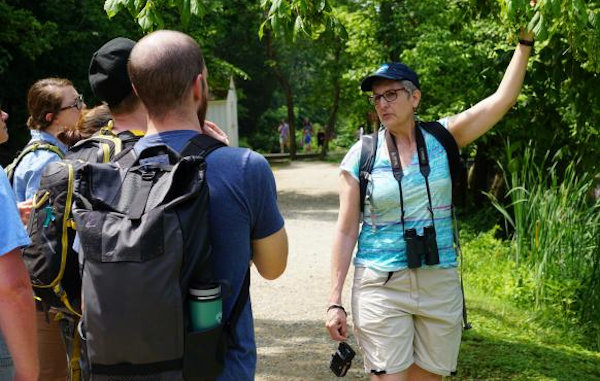Beth Norcross teaches eco-spirituality and eco-theology at Wesley Seminary.
ERIK ALSGAARD
Interpreter Magazine
Every morning, Beth Norcross wakes up and finds the sun. In the process, she also finds the Son.
“Paying attention to the sun for 30 seconds first thing every morning helps to center me beyond myself, centers me in God,” she said. “It helps me notice the changes in the natural world.”
Finding God in nature has been her passion for a long time, Norcross said. The founder of the Center for Spirituality in Nature (www.centerforspiritualityinnature.org), she is also adjunct faculty at Wesley Theological Seminary in Washington, D.C., where she has developed and teaches courses on eco-spirituality and eco-theology.
“Every person I’ve encountered has a story of finding God in the natural world,” said Norcross. “It also has the opportunity to be a great unifier; something happens in the natural world that can be shared by everyone. It’s a place where I don’t think God is more present to us, we are more present to God.”
Norcross’ reading of Scripture tells her that the natural world was humanity’s first way of encountering God.
“We were hungry and there was food coming from the earth,” she said. “What’s that about? Who is that provider? Eventually, we began to construct a theology around the provider.”
If we lose that connection between God and what God created, Norcross believes we are cutting ourselves off from an important aspect of our faith.
Reconnect to God
The center works to reconnect people to God through nature through classes and nature walks with practice of spiritual disciplines.
How could you get re-connected?
“Go outside; it’s really as simple as that,” Norcross said. It doesn’t matter if you live in the city or the most rural area of the world, going outside and paying attention to what God has provided is the place to start. “There’s something of nature virtually everywhere.”
The Center’s website offers 12 spiritual practices a person or group could do to find spiritual inspiration.
“By reconnecting us with the wisdom of nature infused in our faith story, we reconnect with our deepest selves; we reconnect with the Creator and with the creation,” Norcross said.
The Rev. Jeanne Torrence Finley, a retired clergy member of the Virginia Conference, has written about spirituality and nature. In 2009, she signed up for Master Naturalist classes and started a sketch book as a way to keep a nature journal.
At the same time, her daughter started chemo treatments. Finley went along to offer support.
“When I was sketching nature, even at the cancer center with my daughter, I found it was a contemplative discipline for me,” she said. “I felt more connected to God. It became a spiritual practice to help me get through that period. It gave me a steadiness that I didn’t get in any other way.”
Worshipping the Creator
Many people, Finley said, are fearful of spiritual practices that involve nature thinking they may contain “new age” connotations, such as worshipping a tree and not God.
“God made the tree; God loves the tree,” Finley said. “We’re not worshipping the tree but the one who made it.”
Finley recommends several books for people wanting to connect more with God through nature. Among them is Last Child in the Woods in which author Richard Louv coined the phrase “nature-deficit disorder.” Finley agrees that keeping children away from nature, for whatever reasons, removes a key component of faith development.
“My parents brought me up outside,” she said. “It helped me see the connection between God and nature.” She urges parents and churches to go on field trips or to take a day trip to a United Methodist camp or retreat center to learn about nature – and draw nearer to God.
Note: The Rev. Erik Alsgaard, well known to the Michigan Area, is now editor of Connection, the newspaper of the Baltimore-Washington Conference. This feature originally appeared in the March-April edition of The Interpreter Magazine.
Last Updated on April 25, 2017

